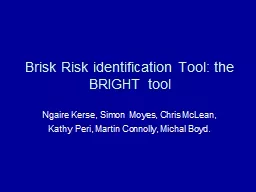PPT-The bright side of dread:
Author : conchita-marotz | Published Date : 2017-07-04
Anticipation asymmetries explain why losses are discounted less than gains 1 David Hardisty UBC SampP Workshop Jan 9 th 2017 2 CoAuthors Shane Frederick Elke
Presentation Embed Code
Download Presentation
Download Presentation The PPT/PDF document "The bright side of dread:" is the property of its rightful owner. Permission is granted to download and print the materials on this website for personal, non-commercial use only, and to display it on your personal computer provided you do not modify the materials and that you retain all copyright notices contained in the materials. By downloading content from our website, you accept the terms of this agreement.
The bright side of dread:: Transcript
Download Rules Of Document
"The bright side of dread:"The content belongs to its owner. You may download and print it for personal use, without modification, and keep all copyright notices. By downloading, you agree to these terms.
Related Documents














